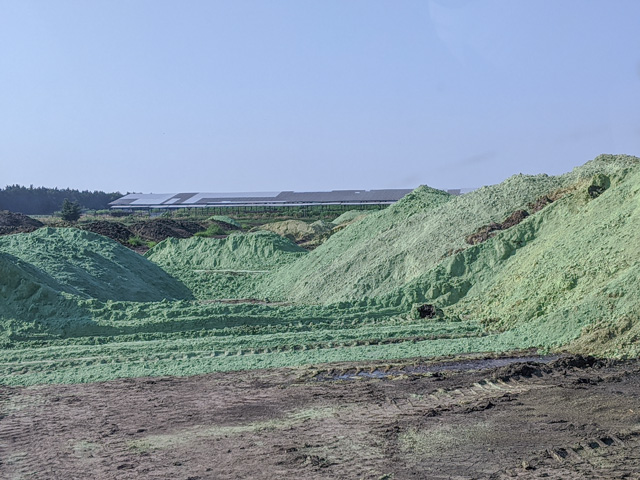Neeley's Favorite Story of 2021
Nebraska Town's Environmental Disaster is Tragic Reminder of Why We're Journalists
Editor's Note: 2021 was a wild one, from a tumultuous change in the White House, to continued La Nina influences on the weather, to skyrocketing fertilizer and input costs. There were also a lot of good stories to tell. As the calendar year comes to a close, we asked the DTN/Progressive Farmer writing team to pick their favorite effort from the year. The stories range from fun insights into ag entrepreneurs to serious investigations into the unintended consequences of popular production methods, to life lessons learned along the way to telling the tale. Each story also includes a link to the original story, in case you missed that. Enjoy a look back, with our fifth story shared by Todd Neeley.
**
LINCOLN, Neb. (DTN) -- Every once in a while, a story comes along that checks all the boxes for any red-blooded journalist as a likely reason why they started in this business.
It features big guy versus little guy, plenty of conflict, unexplained actions, or inactions by people in power, and we the journalists essentially stand in the middle.
This is why the inexplicable environmental disaster that unfolded at an ethanol plant in Mead, Nebraska, in 2021 is my favorite story of the year.
I write a lot of stories but perhaps nothing as important as when I was part of the editorial team at DTN that started asking tough questions about what was unfolding in Mead.
We wanted to know why the ethanol plant in the town of 608 west of Omaha was allowed to store distillers dried grains contaminated with pesticides on facility grounds and what, if any, oversight was conducted of where unused treated seed ends up.
Mead residents reported numerous health issues from what they said was a strong odor emanating from the plant.
They expressed concern to state and local officials about how plant owners AltEn LLC's actions may have affected groundwater. Through our reporting we learned a lot about the plant, including that a large volume of pesticide-treated seed was disposed of there by major seed companies.
P[L1] D[0x0] M[300x250] OOP[F] ADUNIT[] T[]
AltEn processed millions of bushels of corn seed treated with neonicotinoid pesticides and fungicides until 2020 and marketed the plant as an option for seed companies to dispose of treated corn seed.
The ethanol plant's wastewater became contaminated with a high concentration of neonic pesticides, as did the ethanol plant's distiller's grains. Since neither its wastewater or leftover wet cake could be applied to area farmland, the lagoons remained full of contaminated water and there was an estimated 84,000 tons of wet cake in piles at the plant. Nebraska sued the ethanol plant in March to shut it down.
We wrote several stories, continuing to push for answers, essentially serving as a voice for the small town.
One story in particular stands out for me. You can read the story "Mead Seeks Answers on Plant Cleanup" at https://www.dtnpf.com/….
In May, I covered a Mead Planning Commission meeting where the village acted to further prevent the plant from producing ethanol.
What was most heart-wrenching for the Mead community was the plant originally was touted by the developer, E3 Biofuels, as a one-of-a-kind closed-loop ethanol plant that would rely on no outside fuel sources to produce ethanol as a fine example of environmental stewardship. The idea was the plant would use methane produced by cattle at a feedlot next door to operate the plant.
Most importantly, Mead residents were told the plant would bring much-needed economic development to the town -- it would expand the tax base, increase tax revenues to the village government, and so on.
I remember attending the groundbreaking for the plant and a visit by then Nebraska Gov. Dave Heineman. It was an exciting time for the community.
Mead was the toast of Nebraska, garnering international attention for what was to be a high-tech venture sure to impress the world.
Fast forward to May 2021. The picture changed dramatically.
Mead village officials were looking for help from the state. They wanted to know if there's a future for their community.
At that May commission meeting, village of Mead officials said state officials were providing little or no information. They were simply left in the dark.
Mead's leaders knew little about the extent of the environmental disaster and what it might mean for the community. Those questions remain unanswered.
Seed industry officials eventually agreed to lead an ongoing cleanup at the plant with the state's oversight.
Our coverage of the tragic story in Mead is something I'll always be proud of as a journalist.
We asked the tough questions. We dug through state environmental documents, talked to seed company officials and tried to get AltEn to talk.
We conducted journalism as it was meant to be conducted -- questioning everything with vigor and demanding answers for the 'little guy.'
Stay tuned.
Todd Neeley can be reached at todd.neeley@dtn.com
Follow him on Twitter @DTNeeley
(c) Copyright 2021 DTN, LLC. All rights reserved.



